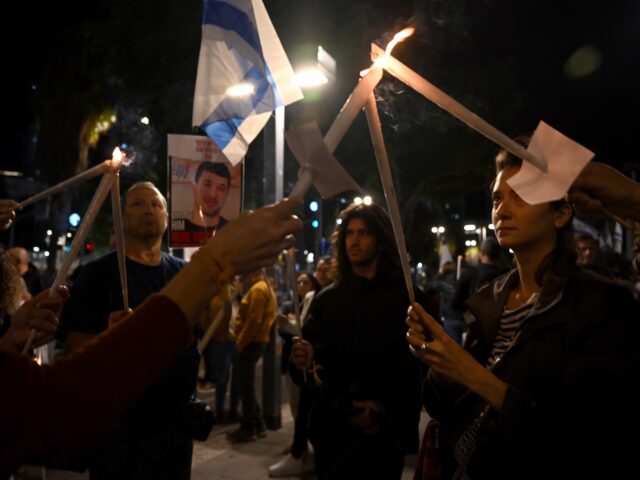The Israel Defense Forces (IDF) revealed Saturday after an inquiry that the three hostages who were mistakenly killed on Friday were shirtless, waving white flags, and calling in Hebrew, and were shot by soldiers who thought they were being lured into a trap.
The hostages had emerged at 10:00 a.m. One of the soldiers who saw them shouted “Terrorists!” upon seeing them. The soldiers opened fire — against protocol, which forbids firing on someone with a white flag. They killed two, and wounded the third, who ran into a building and continued shouting for help in Hebrew. A battalion commander ordered them to stop firing, but they kept on shooting, killing him. At no point did any of the soldiers, including the commander, imagine that the three could be hostages.
In addition, soldiers had found graffiti earlier in the week on a building that read “SOS – three hostages” in Hebrew. They believed the building to be booby-trapped, as many other buildings have been, as Hamas has tried to lure IDF soldiers into ambushes. The IDF had not encountered any civilians in the area in a long time; all of the unarmed men in the area of Shejaiya, in the northern Gaza Strip, had been Hamas operatives. The possibility of hostages emerging into the open simply had never been considered.
It is not yet known whether the hostages were abandoned by their captors, or whether they managed to escape in recent days.
The soldiers who fired on the hostages are reported to be receiving psychological counseling, according to the Times of Israel.
A “darkness” had fallen on the nation in the wake of the tragedy, according to Israel’s Army Radio, as the nation mourned the deaths of the hostages — and wondered what might have been, had the soldiers arrested them rather than shooting toward them.
Had the hostages been rescued, Israel would have won a major psychological victory in the war. Support for military efforts to free the hostages would have risen, and Israel would have been more confident in resisting pressure from the U.S. to stop the war.
Now, the confidence of the nation in a military approach to freeing the hostages has been damaged, and there is intense pressure — internal and, no doubt, external — to resume negotiations with Hamas via Qatar, despite the risk to the overall military mission.
The Times of Israel notes that political differences, suppressed during the war so far, have burst into the open again, with many blaming Prime Minister Benjamin Netanyahu for the tragedy, though there is no connection between any policy and the event. Some are focusing on the fact that the news of the tragedy was delivered by the IDF spokesman, Rear Admiral Daniel Hagari, instead of by the prime minister himself, as has happened at other points in Israeli history when similar tragedies took place.
IDF Chief of Staff Herzi Halevi told the nation on Saturday evening that the military accepted responsibility for the accident, and reiterated that there is nothing that Israeli soldiers want more than to rescue the hostages safely to their families.
Halevi said the hostages had done everything possible to identify themselves, and lamented: “The decision of a spilt second can make the difference between life and death.” He emphasized that it was military pressure that created opportunities to free hostages.
But political commentator Caroline Glick observed there was a very real risk that the tragic deaths of the hostages could derail the entire effort, as happened twenty-five years ago when the deaths of four soldiers in Lebanon triggered a protest movement.
Israel withdrew unilaterally from a “security zone” it had maintained against terrorists in southern Lebanon in 2000. Palestinian terrorists drew the conclusion that force could be used to force Israel to retreat, and the second intifada began shortly thereafter.
The incident illustrates the success of Hamas’s tactics of psychological warfare — both on the troops in the field, and on Israeli leaders. Fake “hostages” leading to deadly booby traps and ambushes conditioned IDF soldiers to fire at real hostages. That will, in turn, make it more difficult for soldiers to fire on actual terrorists in future.
Moreover, Hamas has succeeded in dividing Israeli society once again, and likely increasing external pressure from the United States to stop the war, possibly sparing the terrorist group.
In the interim, the suffering continues: the Hostages and Families Forum announced Saturday that another Israeli hostage, Inbar Haiman, 27, was found to have been murdered by Hamas in captivity. The circumstances of her death were not released.
Joel B. Pollak is Senior Editor-at-Large at Breitbart News and the host of Breitbart News Sunday on Sirius XM Patriot on Sunday evenings from 7 p.m. to 10 p.m. ET (4 p.m. to 7 p.m. PT). He is the author of the new biography, Rhoda: ‘Comrade Kadalie, You Are Out of Order’. He is also the author of the recent e-book, Neither Free nor Fair: The 2020 U.S. Presidential Election. He is a winner of the 2018 Robert Novak Journalism Alumni Fellowship. Follow him on Twitter at @joelpollak.

COMMENTS
Please let us know if you're having issues with commenting.